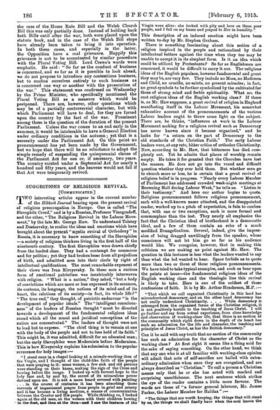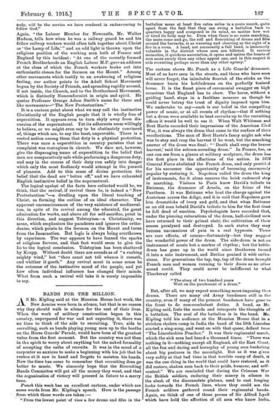SUGGESTIONS OP RELIGIOUS REVIVAL. [Communrceeen.]
TWO interesting articles appear in the current number of the Hibberf Journal bearing upon the present revival of religious preoccupation in Europe. One is called "The Slavophile Creed," and is by a Russian, Professor Vinogradoff, and the other, " The Religions Revival in the Labour Move- ment," by the late Mr. George Haw. To understand Tolstoy and Dostoevsky, to realize the ideas and emotions which have brought about the present " mystic revival of Orthodoxy" in Russia, it is necessary to know something of the Slavophiles —a society of religions thinkers living in the first half of the nineteenth century. The first Slavophilea were drawn chiefly from the landed class. They bad a contempt for commerce and for politico ; yet they had broken loose from all prejudices of birth, and admitted men into their circle by right of intellectual qualifications. The moat remarkable exponent of their views was Ivan IC ireyevsky. In these men a curious form of emotional patriotism was inextricably interwoven with religion. " What is a nation," they asked, "bet a body of convictions which are more or less expressed in its manners, its customs, its language, the notions of its mind and of its heart, the relations of its society—in fact, its whole life P" "The true end," they thought, of patriotic endeavour "is the development of popular ideals." The "intelligent conscious- ness" of the leaders of Russian thought " mast be directed towards a development of the fundamental religious ideas round which all the moral and juridical conceptions of the nation are concentrated." The leaders of thought were not to lead but to express. "The chief thing is to remain at one with the body of the people and not to lose hold of its faith." This might be, it was admitted, difficult for an educated man; but the early Slavophiles were Modernists before Modernism. This is how Kireyevsky explains his submission to the popular reverence for holy images :- "I stood once in a chapel looking at a miracle-working ikon of the Virgin, and I thought of the child-like faith of the people that were praying to it : some women, a few sick and old persona were standing on their knees, making the sign of the Cross and bowing before the image. I looked up with fervent hope to the holy face and, by and by, the secret of its miraculous power dawned upon me. It is not a mere beard covered with painting . . . in the course of centuries it has been absorbing those currents of impassioned prayer from people in grief and misery and it has become a living medium, a means of communication between the Creator and His people. While thinking so, I looked again at the old men, at the women with their children bowing
• to the duet, and then at the ikon—and I saw the Sentare" of the
Virgin were alive she looked with pity and love on these poor people, and I fell on my knees and prayed to Her in humility."
This description of an induced emotion might have been written to-day by Mr. Stephen Graham.
There is something fascinating about this notion of a religion inspired in the people and rationalized by their intellectual betters against the time when they too may be unable to accept it in its simplest form. Is it an idea which could be utilized by Protestants P- So far as Englishmen are concerned, it would be difficult to carry it out. The religious ideas of the English populace, however fundamental and great they may be, are very few. They include no Mast no Madonna and Child, no crucifix, no saints, no present miracles ; in fact, no great symbols to be further symbolized by the cultivated for those of strong mind and feeble spirituality. What are the root religious ideas of the English working class P If there is, as Mr. Haw supposes, a great revival of religion in England manifesting itself in the Labour Movement, his somewhat exhaustive account of the pronouncements of the various Labour leaders ought to throw some light on the subject. There are, he thinks, "influences at work in the Labour Movement making for a religious revival such as Democracy has never known since it became organized," and he looks for " a return on the part of Democracy to the old standards of the Christian Faith." The early Labour leaders were, at any rate, bitter critics of orthodox Christianity. Now, according to Mr. Haw, that bitterness has died com- pletely out. Yet he admits that places of worship remain empty. He takes it for granted that the Churches have lost the masses. He does not go into the vexed and difficult question whether they ever held them. But whether men go to church more or less, he is certain that a great revival of religions belief is in progress. "Nearly every Labour Member of Parliament has addressed crowded week-night meetings at Browning Hall during Labour Week," be tells ue. "Listen to their testimony." And here our author begins to quote. Religions pronouncement follows religious pronouncement, each with a well-known name attached, and the disappointed reader, worked up to a pitch of expectation, is fain to confess that, with one or two exceptions, each is more formal and commonplace than the last. They nearly all emphasize the fact that the Christian ideal of brotherhood is a democratic ideal, and a few of them contain an echo of a much modified Evangelicalism. Several, indeed, give the impres- sion of being dragged unwillingly from the speaker, whose conscience will not let him go so far as his audience would like. We recognize, however, that in making this criticism we are making no point against Mr. Haw. The question in this instance is less what the leaders wanted to say than what the led wanted to hear. Space forbids us to quote more than two or three of these religious pronouncements. We have tried to take typical examples, and such as bear upon the points at issue—the fundamental religious ideas of the English working class and the theologic line this revival is likely to take. Here is one of the coldest of these confessions of faith. It is by Mr. Arthur Henderson, M.P.
"That which we call organised Christianity in this land has misunderstood democracy, and on the other hand democracy has not really understood Christianity. . . . While democracy is estranged from the organised forms of the Christian religion, it is not positively hostile to the teaching of Jesus Christ. I will go further and say from actual experience, from close knowledge and observation of working-class life, that there is no section of the community which right down in the depth of its bead has such an admiration for the life and character, the teaching and principles of Jesus Christ, as has the British democracy."
Can it be said with any truth that no section of the community has such an admiration for the character of Christ as the working class P At first sight it seems like a thing said for the sake of saying something. On the other hand, we think that any one who is at all familiar with working-class opinion will admit that acts of self-sacrifice arc hailed with extra- ordinary admiration when once they are recognized, and are always described as " Christian." To call a person a Christian means only that he or she baa acted with marked and surprising unselfishness. The next sentence which strikes the eye of the reader contains a little more fervour. The words are those of " a former general labourer, Mr. James Parker, the Labour Member for Halifax" The things that are worth keeping, the things that will stand by us, the things we shall finally have when the soul leaves the
body, will be the service we have rendered in endeavouring to follow God."
Again, "the Labour Member for Newcastle, Mr. Walter Hudson, tells how when he was a railway guard he and his fellow railway workers would often talk together about Christ as the Lamp of Life,' " and an odd light is thrown upon the religious position of the working men both of France and England by this incident: "At one of the recently formed French Brotherhoods an English Labour M.P. gave an address at the close of which the French workers broke out into enthusiastic cheers for the Sermon on the Mount." Among other movements which testify to an awakening of religious feeling, our author points to the Adult School Movement begun by the Society of Friends, and spreading rapidly around, if not inside, the Church, and to the Brotherhood Movement, which is distinctly Nonconformist in origin and spirit. He quotes Professor George Adam Smith's name for these and like movements—" The New Protestantism."
It is a curious point about what we may call the instinctive Christianity of the English people that it is wholly free of superstition. It appears even to turn shyly away from dim cussion of the supernatural. Yet its adherents seem willingly to believe, or we might even say to be obstinately convinced of, things which are, to say the least, unprovable. There is a rooted notion among them that duty is a physical protection. There was once a superstition in country parishes that no complaint was contagious in church. We dare not, however, give the disparaging name of superstition to the belief that men are comparatively safe while performing a dangerous duty, and may in the course of their duty run safely into danger which only the moat foolhardy would attempt in the pursuit of pleasure. Add to this sense of divine protection the belief that' the dead are " better off," and we have exhausted English instinctive belief in the supernatural.
The logical upshot of the facts here collected would be, we think, that the revival, if revival there be, is indeed a "New Protestantism "—a dwelling upon the literal teaching of Christ, as forming the outline of an ideal character. The apparent unconsciousness of the very existence of mediaeval- ism, in spite of its revival among the educated, the great admiration for works, and above all for self-sacrifice, point in this direction, and suggest Tolstoyism—a Christianity. we mean, which emphasizes the paradoxes and ignores the ortho- doxies, which points to the Sermon on the Mount and turns from the Incarnation. But logic is always being overthrown by experience. The war appears to have fanned the sparks of religious fervour, and that fact would seem to give the lie to the logical conclusion. Tolatoyism has been shattered by Krupp. Without doubt there are sounds as of "a rushing mighty wind," but thou canal not tell whence it cometh, and whither it goeth." Any revival must in some sense be the outcome' of the instinctive mood of the people, and yet how often individual influence has changed their minds. What form such a revival will take it is surely impossible to say.







































 Previous page
Previous page